#so is there specific lighting that changes to portray the passage of time? do shadows change?
Text
*staring very intensely at the neighborhood* what do you look like when you're not a simplified website map
#buzzing with worldbuilding questions tonight#because seriously - what does it look like?#are there more trees than are shown on the site?#what kind of decorations are there? are there fences? how much space is between the houses? are there any Locations?#do the neighbors have set yards or is it unbroken open space with unspoken boundaries?#what is the path made of? chalk doodles are shown on it so it cant be dirt#is it brick? stone? concrete? if any what kind?#we know that frank has a little garden so do the other neighbors have their own Areas?#how big is the neighborhood? how long would it take to walk a full circuit?#how far are the houses from the path?#do the houses (excluding Home) have paths leading to them?#and what do the insides of the stores/houses look like?#welcome home#welcome home puppet show#why do only barnaby & poppy & frank & sally have second floors#while julie & wally only have one?#the bodega and the post office obviously only have one because theyre Stores but why julie and wally?#and then like... how does weather work and lighting?#its a set so the sky is probably Nonexistent (do the neighbors ever notice?)#so is there specific lighting that changes to portray the passage of time? do shadows change?#what do the other sides of the buildings look like?#I HAVE SO MANY QUESTIONS#my need to know everything down to the tiny details is killing me right now#i want to See It. wally darling if youre reading this beam me into your digital puppet world so that i can look around and Know#what do the inside of the buildings look like. how does everyone decorate. i feel insane#what kind of plants are around. we know there are trees/bushes/flowering bushes/several kinds of flowers#oh and how Big are the buildings? the houses?#and the pressing question: CAN BARNABY & POPPY & HOWDY FIT THROUGH HOME'S FRONT DOOR#also why do only home & barnabys house have chimneys? unless that heart thing on julie's roof is a chimney then why them? for symmetry?#also what is on frank's roof. at first i thought chimney But That's Not A Chimney. What Is It. i genuinely have no fucking clue
62 notes
·
View notes
Text
Ai yah, I really have to respond to this post again, huh?
Well, for starters, I apologize for a mistake I made in my original post. In the OP, I insinuated that the Princess Zeldas we see in the series could have possibly had a role in the atrocities committed by the royal family. This is incorrect, and it was poor wording on my part. I should have clarified my intentions when writing that particular passage; however, I felt it was unimportant, given that the point wasn’t solely about Princess Zelda, but how the addition of the Goddess Hylia and the Demon King Demise not only invalidates Ganondorf’s character up to that point, but adds much greater weight to the terrible actions committed by the royal family, especially towards the Sheikah.
Given that tumblr user lorelylantana is the third person to make a reply by discussing the reincarnation cycle, rather than the actual point of my post, perhaps I should have proofread and double checked my post before sending it out into the world to cause problems on purpose.
With that said, after I read lorelylantana’s response, I felt it necessary to make a proper reply of my own. It’s going to be a rather lengthy reply, as I have many things to say and many images to post.
However, I’m going to do all that I can to avoid discussing fanon or fan theories. I don’t mind them, but adding fanon wasn’t the point of my original post, and it shouldn’t have been the focus of the responses I received. I want to stay as close to the canon Nintendo laid out as possible. Thusly, my sources will strictly be drawn from the games, game manuals, Creating a Champion, Hyrule Historia, and Hyrule Encyclopedia. Despite the latter two being dubiously canon, they were approved by Nintendo, so they’re worth mentioning.
So, without further delay, let us begin.
- “The original post seems to be based on the idea that Zelda and the royal family of Hyrule are synonymous, which is questionable for reasons I’ll get into later.”
For all intents and purposes, yes. Zelda and the royal family are synonymous, as she is the face of the royal family in almost every Zelda game featuring her. Even if she isn’t the ruler of Hyrule in that particular moment, she is our figurehead for the monarchy, by all means.
- “The games don’t hand wave the actions of Hyrule’s royal family, they just don’t go out of their way to hold a young girl personally responsible for the actions of kings […]”
While the actions of the royal family are briefly acknowledged, as is the case with the Shadow Temple and the Arbiter’s Grounds, the monarchy has never had to answer for their actions. Even in the case of the Sheikah’s massive exile 10,000 years ago, the royal family never answers for this, nor are they ever portrayed being in the wrong. In fact, the event in question is only mentioned by a single member of the Sheikah in Breath of the Wild, Cado.

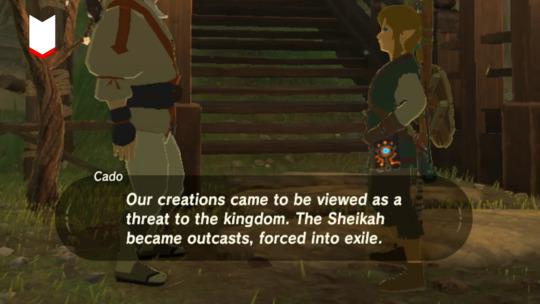
Image credit goes to YouTube user Macintyre.
The royal family’s actions are never directly described as “these were horrible things that happened.” Instead, it’s simply, “yeah, it happened.” There is no acknowledgement that the Yiga was created by the royal family’s own hands, nor is there any emphasis placed on the impact any of these acts have.
For example, the exile of the Sheikah wasn’t even the first instance of the royal family of Hyrule mass-exiling a group of people and displacing them from their original homes.
After the events of Ocarina of Time, Ganondorf is captured and executed for his crimes leading up to the events of the game and presumably the events of the Adult Timeline, given Young Link’s testimony. (I’ll get into why the King of Hyrule believes Link over Zelda later.) After Ganondorf was executed, the Gerudo were forced out of Gerudo Valley and banished from the Haunted Wasteland. Even during the events of Twilight Princess, the Gerudo Desert is completely abandoned. Once again, there is no discussion concerning the royal family’s actions, with the narrative instead being that the Gerudo, some of whom were actively against Ganondorf’s actions and many of whom were hypnotized during the events of OoT, are entirely at fault and have to atone for their sin of… having Ganondorf for a leader, I suppose.

Source: Creating a Champion, p. 405
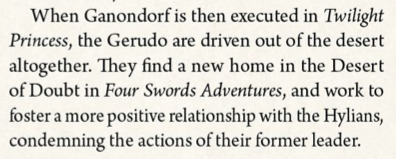
Source: Hyrule Encyclopedia, p. 46
The royal family gets to punish an entire people for the actions of one man. Rather than the act being portrayed as negative or even discussed, it’s hardly even mentioned.
While I’m aware Encyclopedia’s canonicity is dubious at best, its material was still approved for publication by Nintendo. Thusly, I feel it worthy to discuss.
To summate, the royal family did bad things, and very select few acknowledge it.
Next point.
- “I think that the Zelda/Hylia = good Ganon = bad situation serves a narrative purpose that justifies the black and white nature of the games because it highlights the shades of gray in between installments…”
The Legend of Zelda is almost thirty-five years old. This series should have long evolved beyond the black-and-white-morality narrative, especially when the side we’re supposed to sympathize with literally used the Sheikah to commit war crimes. You don’t have to have stark white and pitch black in order to see shades of gray.
- “… And trying to assign Zelda a dark side is kind of missing the point, especially when no one seems to question Link’s morality even though he’s constantly stealing people’s stuff.”
Examples of Consequences to Link Stealing People’s Stuff
1. In Twilight Princess, stealing from Trill will result in the bird branding you a thief and pecking you every time you come near him, which will only cease when you finally pay up.
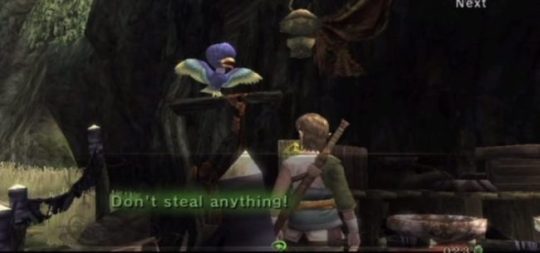
2. In Link’s Awakening, stealing from the old man’s shop will result in instant death the next time you enter his shop. If you steal, your name is changed to THIEF for the rest of the game.

Furthermore, Link is controlled by the player; thusly, his actions have no consequence to the story or Link’s character. Zelda, on the other hand, is an active participant in the story, whose actions and whose family’s actions weigh heavily on the games. That’s not to say Zelda is ever evil. However, as much as she is a victim of her own family’s history, she still has just as much power to change it.
- “If the games wanted to gloss over the sins committed by the royal family[,] they wouldn’t have designed entire dungeons around them.”
I reiterate: the sins of the royal family were mentioned once, and then immediately dropped shortly thereafter. It’s not there for you to dwell upon, merely window dressing as if to say, “Yeah, that happened.”
- “I believe The Legend of Zelda series is a critique of the Divine Right of Kings”
Until the events of Skyward Sword, the Hylian Royal Family wasn’t a divine lineage. A thirty-five-year-old series can’t be a critique of a concept that it barely even acknowledges. The only emphasis placed on the “goddess blood” part of the royal family is in Breath of the Wild, in relation to Zelda having to unlock her sealing powers. Despite the massive repercussions the revelation of the royal family’s lineage tying back to divinity should have, it’s barely even mentioned,let alone discussed.
As a side note, the divine right of kings specifically denotes that the monarch is chosen by God to rule. In contrast, the Hylian Royal Family continues to rule by, presumably, claiming lineage to the Goddess Hylia, which is closer to traditional practice in feudal Japan.
- “If the Divine Right of Queens is indeed present, does that justify a hereditary monarchy? As far as the Legend of Zelda is concerned[,] the answer is no.”
The Legend of Zelda series never questions the validity of the royal family’s rule.
- “Isn’t it funny that the Kingdom of Hyrule seems to be perpetually stuck in the dark ages?”
Ocarina of Time has neon lights, jukeboxes, and canned goods. The lakeside doctor’s chemistry is advanced enough that he is able to synthesize eyedrops. Given the newspaper articles strewn about shops, Hyrule also has pictoboxes in OoT.
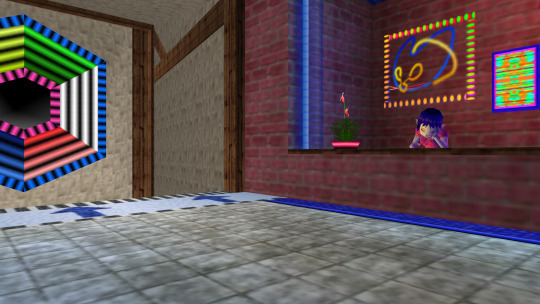
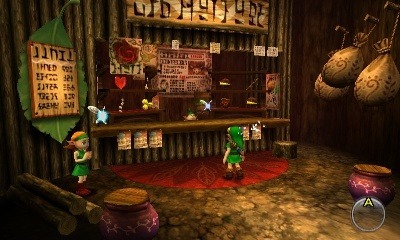
By Wind Waker, pictoboxes have evolved to print in color. In Phantom Hourglass, Linebeck’s ship is steam-powered.
In Twilight Princess, pictoboxes now print higher quality images. In addition, with the introduction of Malo Mart’s Castle Town branch, TP is confirmed to have fully functional electrical lighting in some places. Cannons are so safe, you can get launched out of one for fun. Pyrotechnics have grown advanced enough that explosives can function underwater, and Death Mountain has become a functioning, refined mining facility stable enough for Hylians to safely walk in. Also, Auru has a bazooka.
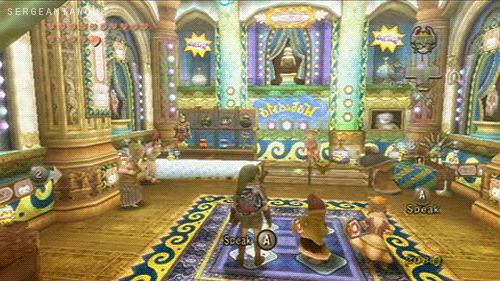
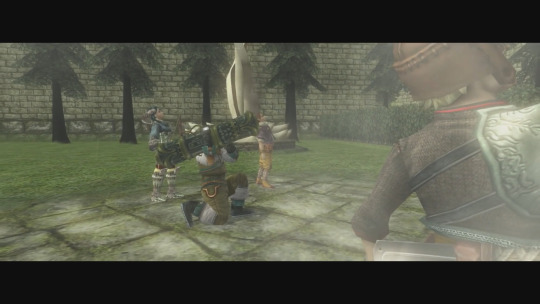
SPIRIT TRACKS HAS TRAINS. THEIR AESTHETIC DIRECTLY REFLECTS THE INDUSTRIAL REVOLUTION.
Hyrule is hardly stuck in the dark ages. It’s high fantasy.
Next point.
“For starters, I want to establish that I don’t agree with the assumption that what the Hyrulean Royal Family does = Zelda/Hylia would do. I don’t think it’s a mistake that almost every text in the OP explicitly mentions that it was a King that committed those acts, not Zelda herself.”
Once again, that was an error on my part. It wasn’t my intention to imply Zelda had any part in such actions. However, Zelda learns how to rule from her father, or her mother, or whomever holds the throne in that particular moment. These acts are never questioned in canon beyond “Yeah, that happened,” and the most conflict we have is the issues between Zelda and her father in Breath of the Wild boiling down to how to confront the Calamity—science vs. sealing magic— rather than anything else.
It’s a personal issue, and Rhoam treats Zelda terribly, essentially alienating himself from his own daughter and treating her as little more than a pawn. I agree that it’s absolutely terrible. However, that’s merely a personal issue. She’s complicit in how Rhoam addresses the Sheikah, possibly even fully aware of the anti-aging rune Purah was developing to force retired soldiers into battle against the Calamity, and from what we’ve seen in Age of Calamity, she doesn’t have an understanding of the Yiga Clan other than the snide remark Urbosa gives:

Image credit goes to YouTube user BeardBear.
It’s up to Zelda to develop a deeper understanding of her country’s history; not to take personal responsibility, but to understand where those who are suffering are coming from.
That said, acting with the Hylians’ best interests at heart is exactly something Hylia would do.
In the prologue to Skyward Sword, the Demon King and his army attack the Hylians, slaying many and throwing the world into despair. Thus, the Goddess Hylia saves the Hylians by sending a chunk of land up into the heavens, sparing them from the war to follow while she gathers every other race to fight alongside her.
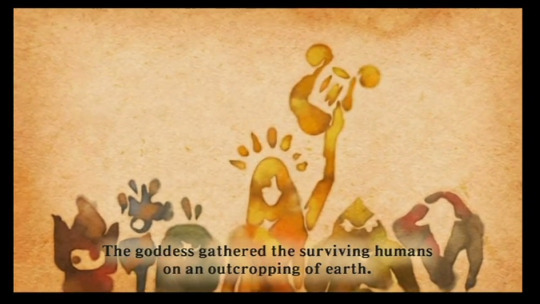
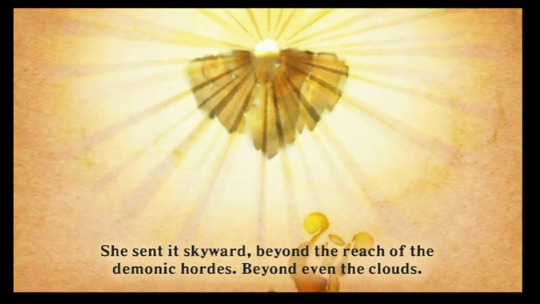

So… How come Hylia only saved the Hylians?
I understand many were wiped out by demons, but if Hylia was fully prepared to spare people from violence, why not also send small numbers of every other race? Why only save the Hylians, her chosen people, while essentially dragging everyone else into battle with her? Furthermore, when Hylia’s immortal body suffered grave injuries, she opted to take advantage of this by choosing to be reborn as a person. Not only is it explicitly stated that Hylia reincarnated in order to utilize the Triforce’s power, as she could not do so as divinity, but she knowingly chose to be reborn as someone who would become close with her chosen hero, in order to influence him to follow her plan without hesitation.
Hylia used Link.
That much is certain, and it’s laid out clearly by Zelda shortly before she takes Hyrule’s longest beauty nap.
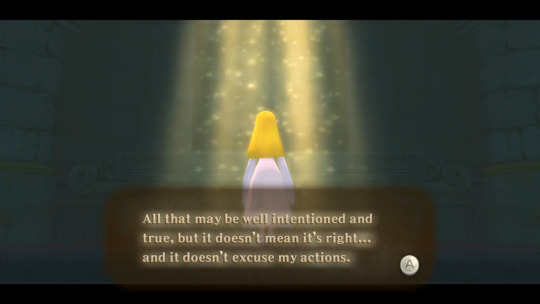
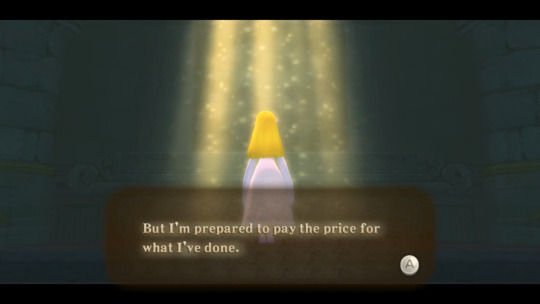

It must be noted that while Zelda states she is Hylia reborn, and has regained Hylia’s memories by this point, she still sees herself as a separate entity from Hylia. While she herself is immensely guilty and apologizing over and over for what she’d done in her previous life, we have no way of knowing if Hylia herself would react the same way.
In fact, according to a fan-translation by ZeldaUniverse user Yamikawa, Demise goes as far as to describe Hylia as “brave and so-prideful,” hinting that even a being who loved her chosen people so much to save them still saw them as beneath her, if being reborn as human is seen as such a drastic extreme contradictory to her supposed character. Now, this is merely reflection on the inner workings of the Demon King, so his word can’t be taken as gospel. But, like all things, I find it interesting.
From what I can gather, however, Hylia certainly cared more about the Hylians than any other being in the land of Hylia, not dissimilarly to the royal family.
- “I also don’t think that every princess Zelda is a Princess of Destiny or Representative of Hylia, I think that she reincarnates just about as often as Link and Ganon(dorf) do, because the logistics don’t really work out otherwise. This leaves hundreds, if not thousands of years where Zelda/Hylia isn’t on the throne.”
This is merely speculation. Moving on.
- “There’s a notable trend of the King of Hyrule getting in the way of Zelda’s attempts to save the kingdom. First[,] he doesn’t take Zelda seriously [in] Ocarina of Time, forcing her to rely on Link […] I don’t know why the King of Hyrule was willing to listen to a random boy claiming to have been from the future over his own daughter but whatever I guess.”
The King of Hyrule believed Young Link because he came back to the Child Timeline with the Triforce of Courage. Up to that point, the whole Triforce was supposed to be safely locked away in the Sacred Realm, which was supposed to be completely inaccessible without the spiritual stones and the ocarina of time, neither of which Link had. I’d listen to the kid’s story too if he came back with a God Dorito on the back of his hand.

- “And then again in Breath of the Wild when Rhoam bans Zelda from ancient tech research despite the fact that he has absolutely no reason to believe his pray the incompetence away method is the right one.”
The tapestry showcasing the events from 10,000 years ago depicts a princess possessing the blood of the goddess using her sealing magic in order to seal away Calamity Ganon. Link can swing the Master Sword at Ganon or whack him with ancient arrows or light arrows all he wants. Without the ability to seal away the darkness, as shown at the end of Ocarina of Time, all of this preparation and planning would have been for naught. That is why Rhoam is so harsh on Zelda. That’s why so much emphasis is placed on unlocking her power. Without it, defeating Ganon would be impossible.
On that note, Rhoam also had no idea what he was doing. Zelda’s mother was the one with the sealing magic, not him. She was supposed to be the one to train Zelda, but she passed away before she got the chance to even start. He puts so much emphasis on prayer rather than ancient technology because he genuinely doesn’t know what else to do.
I can’t believe this post forced me to defend Rhoam of all people I’m gonna have a stroke—
- “Also, this is purely speculation, but [I’m] pretty sure there’s an implication that King Daphnes Nohansen caused the flooding of Hyrule in Wind Waker […] This sounds like a wish on the Triforce that backfired[,] but I digress.”
Daphnes couldn’t have made a wish on the Triforce before Wind Waker because, when the Hero of Time left the Adult Timeline, that timeline’s Triforce of Courage shattered into eight pieces and scattered throughout the land—er, ocean. Even if he had Wisdom on him, Ganondorf still possessed the Triforce of Power when he was sealed away, and he wasn’t going to let go of it when he broke free.
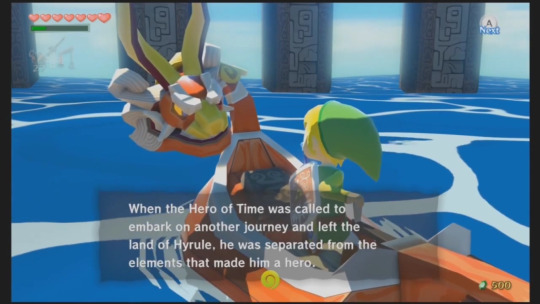
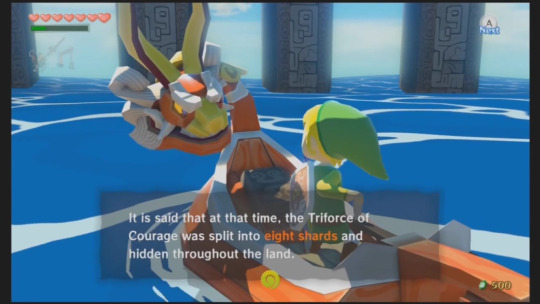

Besides, if Daphnes did wish on the whole Triforce, it would have disappeared. There would have been no Wind Waker.
- “When she saves Hyrule in spite of interference…”
I’m not even going to finish the quote because the entire paragraph is too much for me to unpack. I’m assuming they’re saying that Zelda is never the one truly in power, and the royal family takes advantage of one Zelda’s good deeds to get brownie points.
However, concerning the first line…
In Ocarina of Time, Zelda going behind her dad’s back to try to “save Hyrule” leads Ganondorf straight to the Sacred Realm. Even though a time paradox leads to everything turning out okay in the end, the bleak future was created because Zelda wanted to play hero and pulled Link along with her. Even if Ganondorf managed to wrench the spiritual stones away from the Zora and Gorons, he wouldn’t have been able to access the Sacred Realm if Zelda didn’t send Link there to pull out the Master Sword, which Ganondorf would have never been able to touch. By all means, Ocarina of Timehappened because a little girl was in over her head and tried to take matters into her own hands when her dad didn’t believe her.
Aside from Breath of the Wild, there’s no other “interference” from the royal family that Zelda has to face.
- “Zelda is the representation of a deity, so it makes sense that people would worship her to some extent, and having a goddess on the throne [probably] blesses the land. So[,] while the kings of Hyrule have a tendency to screw things over, [it makes sense] for Hyrule to be a monarchy because Zelda’s power as the goddess incarnate is needed to defend against Ganon and other threats, [r]ight?”
I acknowledge the author is attempting to portray the royal family’s possible justification for their rule. However, until I reached the succeeding passage, I believed it was the author making this justification, given how the entire paragraph preceding this was pure speculation. Once again, this passage is speculative, as nobody in Hyrule has ever explicitly given any notable opinion concerning the royal family. Why try to justify your rule when nobody’s criticizing it?
Since the author brings up Zelda being a representation of Hylia, however, it does bring to mind a particular problem I have with the royal family suddenly being goddess-blood.
It completely recontextualizes the relationship between the royal family and the Sheikah.
According to Creating a Champion, the Sheikah have a deep devotion to the Goddess Hylia. Since the royal family is descended from the goddess reborn, the Sheikah thusly are deeply devoted to the goddess Hylia.
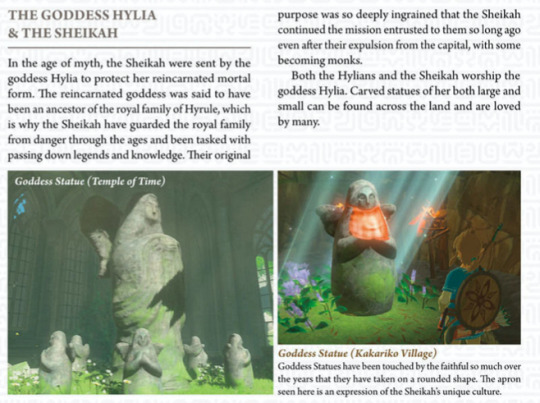
Source: Creating a Champion, p. 372
Now, the royal government using a minority group of people to do your dirty work is already scummy enough when you’re just a normal royal. In this case, however, the Sheikah are so devoted to their goddess that they will do anything for you. Whether it’s because certain monarchs are a “representation of a deity” remains to be seen, but the point is that they’ll do anything for you.
And the royal family takes complete advantage of a group of people unconditionally loyal to them, bidding them to do unspeakable things in the name of their religion, which for all intents and purposes is the royal family.
That’s absolutely deplorable, and it’s a wonder nobody’s brought attention to it yet, whether in-canon or in-fandom. What’s more, given how Impa is always Zelda’s attendant, this relationship is never questioned or criticized, whether it be by the Sheikah or Zelda herself.
And that’s terrifying.
- “The reason Ganon is always an antagonist is because he’s the vessel for the curse of Demise.”
Demise was introduced in Skyward Sword. Demise is the root of all evil, the creator of monsters and conjuror of demons. He is pure evil in every sense from the word, the Zelda series’ version of Satan. Naturally, he’s as simple as you can get in terms of character. Barebones characterization, providing only just enough to tell the player exactly what they need to know:
He’s evil, he’s powerful, and he wants the Triforce. You have to stop him.
Ganondorf existed before Demise. Ganon had over twenty years of development before Demise brought his progress to a permanent flatline.
Who was Ganon before Demise?
Allow me to remind you.
In The Legend of Zelda, first released on February 21st, 1986, Ganon is simply described as “the Prince of Darkness,” and steals the Triforce of Power when he invades Hyrule. After the Triforce of Wisdom is shattered, he kidnaps Zelda.
He’s evil, he’s powerful, and he wants the Triforce. You have to stop him.
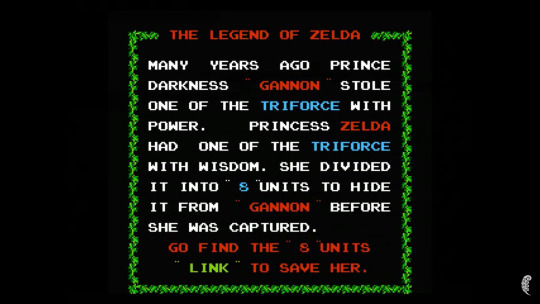
Although Ganon doesn’t physically appear in Zelda II: The Adventure of Link, released in 1987, his presence is still felt as his minions pursue Link in order to revive the Prince of Darkness. In fact, the game over screen is the successful revival of Ganon.

Now, given that these are the first two games in the series, it’s perfectly alright for Ganon to be as barebones as he was. After all, many villains at the time were the same way, with the most notable of Ganon’s counterparts being Bowser from the Super Mario Bros. franchise.
However, with innovation of technology comes innovation of narrative, and it’s with the release of A Link to the Past in 1993 on the SNES that we begin to see Ganon develop as a character. In the prologue to ALttP, Ganon is revealed to have once been human; he is given the name Mandrag Ganon—or Ganondorf Dragmire, as we now know him—and he was once the leader of a band of thieves who sieged the Sacred Realm and took control of the Triforce after murdering his own followers.
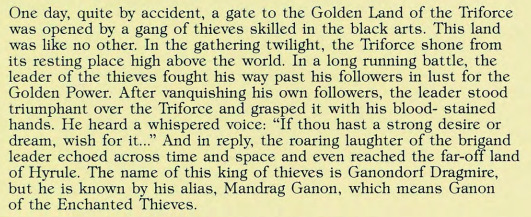


Source: A Link to the Past SNES game manual
Ganon is still irrevocably evil, but in this case, we begin to learn more about him. We begin to see a character starting to form. One who isn’t just mindlessly evil, but who has the charm and wit to infiltrate Hyrule Castle and earn the King of Hyrule’s trust in the guise of Agahnim. Ganon was also a very capable leader, having successfully led his band of thieves straight to the Triforce. Even after wishing upon the Triforce and corrupting the Sacred Realm, Ganon’s power attracted followers in the form of greedy, power-seeking people. He’s powerful not by brute force alone, but through his cunning use of intellect.
Ocarina of Time served to further develop Ganon in little ways. For example, this is the first game wherein, for the majority of the game, Ganon is seen and referred to by his human form: Ganondorf. Ganondorf is shown to be powerful enough and stealthy enough to infiltrate the homes of the Zora, the Gorons, and the Kokiri, and send dangerous hazards their way in an effort to seize the Spiritual Stones. At the same time, he is first seen at an audience with the King of Hyrule, as if there for diplomatic reasons.
Although Zelda sees Ganondorf as evil because of her prophetic dream, the King of Hyrule doesn’t believe her. Because of this, we can infer that Ganondorf has enough charm and charisma to, if not win over the King of Hyrule, not be seen as suspicious despite the horrible acts he’d committed, not just in the past, but at that very moment. He’s also shown to be highly cultured, shown at the end of Link’s ascent up Ganon’s Tower. Not only is Ganondorf playing his own theme, but he’s doing so on the pipe organ, which is notoriously one of, if not the most difficult musical instrument to master.
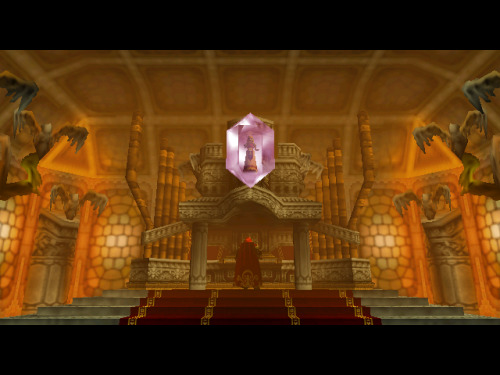
Once Ganondorf seizes the Triforce of Power, the kingdom of Hyrule is subjected to seven long years of his rule. During this time, normal people such as Ingo succumb to their greed and follow Ganondorf’s influence in pursuit of power and riches. Although Malon is naïve enough to believe Ingo was somehow under Ganondorf’s control, it’s clear to players that he was completely in control of his actions, and that Ganondorf’s rule brings out the worst in seemingly average people.
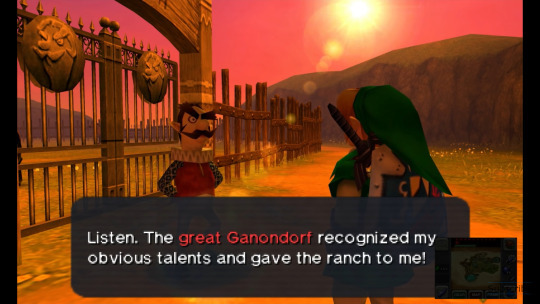
Image credit goes to YouTube user ZorZelda.
Even a Hylian knight can fall under this influence, with it highly inferred that the knight who once guarded a room of pots for Link to smash is now a twisted poe collector, the man even stating that he likes it better this way.
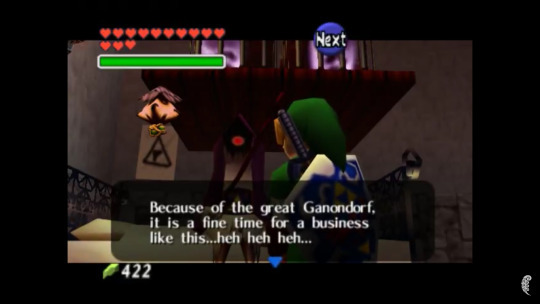
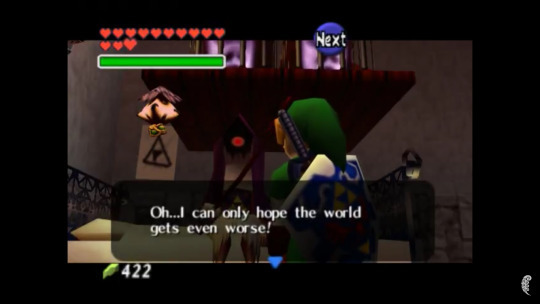
In Wind Waker, we finally see a more introspective side to Ganondorf. While he’s just as ruthless and fully ready to murder a child in the name of accomplishing his goal, he reveals the reason that started him on his path of darkness:
His people were suffering, and he wanted for his people what Hyrule had. He believed that taking Hyrule and taking the Triforce meant that his people could finally live freely, away from the harsh desert.
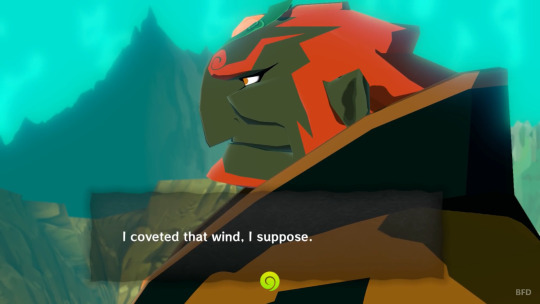
Now, I’ve seen this challenged time and time again. Was Ganondorf lying to distract or manipulate Link? Was he telling the truth? Is this what Ganondorf has convinced himself to believe, after so much time sealed away and in isolation? We will never know, and that’s part of what makes the game so interesting. Ganondorf’s portrayal is a large part of why so many people love Wind Waker, and it’s not hard to see why.
Perhaps the darkest the Zelda series has ever gone in terms of the Triforce’s power was in Twilight Princess. After freeing Lanayru, the Light Spirit warns Link of the dark power he seeks, the Fused Shadow. In order to do this, she explains the history of the Triforce, and the bloodshed brought by its allure to the darkness in the hearts of men. Before the construction of the Temple of Time, many battles were fought, and one of them was the “Interloper War” that inevitably resulted in the creation of, not only the Light Spirits, but the Twili and the Twilight Realm.
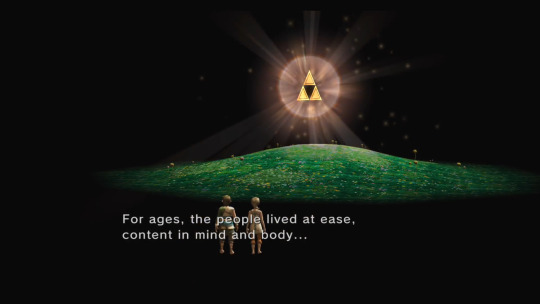

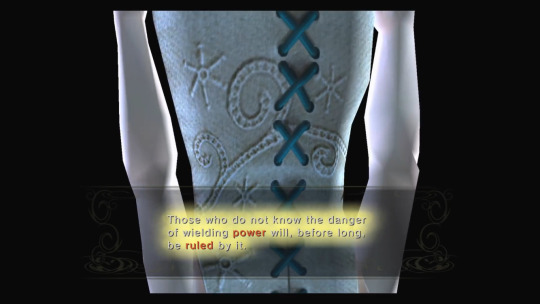
It’s important to note that Lanayru’s cautionary tale highlights that Link, the hero of the story, could succumb to the allure of the Triforce and dark magic just as easily as any other person. In this particular case, anyone could have fallen down the same path as Ganondorf. If anything, this tale is one of the most important bits of lore to take into consideration when discussing the series.
Anyone could have been in Ganondorf’s shoes. It could have happened to anyone.
Then, in one fell swoop, Skyward Sword ruined it.
In a single game, every bit of progress on Ganondorf is lost. Once again, we’re dragged down to the baseline characterization from the original game.
He’s evil, he’s powerful, and he wants the Triforce. You have to stop him.
Suddenly, everything the previous games had built up no longer matters. There’s no longer a need to question whether what Ganondorf did was solely out of greed, but also out of what he felt was necessity. There’s no need to wonder if Ganondorf was once a rational man, who succumbed to the irresistible pull of the Triforce like so many before him.
Ganondorf is, purely and simply, the reincarnation of Satan, so there’s no need to go any deeper than that.
And that’s why I hate this “vessel of Demise” thing. It completely undermines everything Ganondorf once was and reduces him to a single, cardboard cutout of a villain.
Moving on, before I get sad.
- “This curse is specifically tied to Hylia’s bloodline and the Link’s soul, which is pretty specific…”
Demise’s curse is essentially dooming the earth with a never-ending rebirth of his hatred; his malice, if you would. The wording of his curse is specifically “people like you,” which could mean that it isn’t Link and Zelda’s exact souls that are tied to his hatred. Rather, people possessing the blood of the goddess and a heroic, courageous soul are doomed to deal with this curse.
However, my thoughts on this matter are pure speculation.
Also, Demise specifically targets his curse at people like Link and Zelda because they were the ones to kill him in the first place. That much is obvious.
- “… [So] why do the clashes with Ganon always throw the fate of Hyrule into disarray? Because Zelda’s bloodline runs the country.”
Ganon would attack Hyrule even without Zelda’s family in charge. His pursuit of power and domination of the Triforce/Hyrule is therefore closely tied with the fate of Hyrule. Goddess blood on the throne has nothing to do with it.
- “If Zelda came from a small town the curse would probably manifest in peril for that one region which isn’t great but it’s better than an apocalypse.”
Firstly, this is a run-on sentence. Secondly, I reiterate: Ganon would attack Hyrule as a whole, regardless if Zelda’s bloodline was on the throne. It wouldn’t matter if Zelda’s whole family suddenly moved to the countryside. When Ganon inevitably comes back, he’s still gonna go straight for the Triforce or to conquer all of Hyrule. Goddess blood isn’t even part of the equation for Ganon. And if goddess blood isn’t there to stop him, then that’s even better.
Alright, so I’m not even going to bother gratifying the last two paragraphs of the response with an answer, because it’s all rambling that has nothing to do with the original argument. Relinquishing the throne would do nothing to right any wrongs dealt to the many people who were hurt, and evil doesn’t care about a single princess with goddess blood or a boy with a pointy stick.
In conclusion, the addition of Hylia made it so that the royal family’s power dynamic with the Sheikah is even more critically imbalanced than it originally was, making the exile of the Sheikah 10,000 years ago even more heinous than it originally was. Yet, because Hylia is portrayed as wholly good and incapable of doing wrong, despite in-game evidence to the contrary, the royal family, and Zelda by extension, will never be criticized for any wrongdoing. In fact, doing so may well be heresy, if the responses to my original post are anything to go by.
By comparison, the addition of Demise diminishes Ganondorf’s character, rendering him down from the makings of a complex, human character—where anyone could have easily been in his place and had the same greed and ambition for power—into simply the reincarnation of the literal devil, where of course he’s evil, and you don’t have to do any digging beneath the surface. Ganondorf is the reincarnation of Demise, or his hate, or his vessel, so he’s pure evil and nothing more.
And that’s the greatest disservice Nintendo has ever dealt to The Legend of Zelda.
#legend of zelda#ganondorf#princess zelda#breath of the wild#botw#loz#tloz#ocarina of time#twilight princess#zelda#link to the past#alttp#wind waker#ganon#the legend of zelda#hylia#goddess hylia#demise
46 notes
·
View notes
Note
Hey! I just finished listening to the ROTS audiobook for the first time and GAWWWD i loved it. So beautiful, so heartbreaking, so tragic. So many incredible descriptions of characters and themes. So many hilarious lines and quips. But I gotta ask, during his commune with Qui-Gon, Yoda claims that the Jedi lost because they failed to change with the times whereas the Sith had evolved. Yoda apologizes to Qui-Gon for not seeing the wisdom he possessed and for being too rigid and traditional. (1/2)
(Actually 2/3) But this kinda goes against everything the Jedi and Star Wars stand for. If the Jedi are defenders of the light, peace, and balance since time immemorial, and are presented as such in the narrative (servants of the senate, forced into a war as a trap by Palpatine), how can Yoda claim that it was the fault of the Jedi they lost? And how can he claim that Luke and Leia should explicitly not be taught in the old ways (not forming attachments) if such ways are NOT wrong?(3/3) I’m Jedi fan #2 (after you of course) so hearing Yoda lament himself and his teachings in this novelization feels bad man. It certainly doesn’t come across in the movies or any other canon material. The whole idea the “flawed Jedi Order” is so annoying coming from Jedi-hating fans who misunderstand the movies but after reading this…I just can’t believe it. Thoughts?
Hi! You’re super sweet to think to ask me about this and I do love everything I’ve read of the ROTS novelzation because IT IS SO PAINFUL IN THE BEST WAY. As heartwrenching as it is, this is why I’m in here in SW fandom because look at all the feelings it gives me!As for where the Jedi went wrong re: the ROTS novelization, it’s sort of summed up in these two passages, when you consider the context of the galaxy around them–that this is about politics and not morals. Here’s Yoda’s thoughts on fighting with Sidious:
Finally, he saw the truth. This truth: that he, the avatar of light, Supreme Master of the Jedi Order, the fiercest, most implacable, most devastatingly powerful foe the darkness had ever known… just-didn’t-have it. He’d never had it. He had lost before he started. He had lost before he was born. The Sith had changed. The Sith had grown, had adapted, had invested a thousand years’ intensive study into every aspect of not only the Force but Jedi lore itself, in preparation for exactly this day. The Sith had remade themselves. They had become new. While the Jedi-The Jedi had spent that same millennium training to refight the last war. The new Sith could not be destroyed with a lightsaber; they could not be burned away by any torch of the Force. The brighter his light, the darker their shadow. How could one win a war against the dark, when war itself had become the dark’s own weapon?
Then the passage from the ROTS novel about Yoda’s talk with Qui-Gon:
And the Force answered him. Do not blame yourself, my old friend. As it sometimes had these past thirteen years, when the Force spoke to him, it spoke in the voice of Qui-Gon Jinn. “Too old I was,” Yoda said. “Too rigid. Too arrogant to see that the old way is not the only way. These Jedi, I trained to become the Jedi who had trained me, long centuries ago-but those ancient Jedi, of a different time they were. Changed, has the galaxy. Changed, the Order did not-because let it change, I did not.” More easily said than done, my friend. “An infinite mystery is the Force.” Yoda lifted his head and turned his gaze out into the wheel of stars. “Much to learn, there still is.” And you will have time to learn it.
There’s also a line from Wild Space, about how “Too old I am to be the last hope of the Jedi.” Yoda thinks and, okay, Legends, but it always illustrated to me Yoda’s dilemma pretty well–they’re in a time of something they’ve never faced before and aren’t prepared for, because they’re not politicians and they’re not soldiers, they’re shoved into that role and run ragged so they never have a chance to recover or barely even breathe between fights, they’re manipulated into either this path or just not helping others at all, AOTC literally tells us that the Force is so clouded in the galaxy that it’s compromised for them. Everything the Jedi had to rely on was crumbled away from them and so of course everyone ran right straight to Yoda because he had the most experience and they were looking for guidance.I’m also going to draw a lot on the Star Wars Propaganda post I made (which is a long read, like 5k words long, so I don’t expect anyone to have to Do Homework for this post, the basic summary is: the Jedi’s greatest flaw was that they were bad at PR, because they are not talked about in the same way that the corruption and moral decay of the overall Republic is) because I feel like these two things overlap a fair amount, because it’s a great meta book on the state of affairs of the GFFA, and because it really lays this all out well!The thing about all of this is that it’s also to be taken with a grain of salt, that this is Yoda’s point of view in the very lowest point of his life, he’s just witnessed the deaths almost every Jedi and their entire culture, the Republic has fallen, they were ground down in this war they thought would be worth the sacrifices they were making, but instead everything was ashes. Of course he’s going to feel like everything is wrong, that they were mistaken, because that’s a normal reaction to have in the moment!But it’s also about the structure of the prequels, in that politics are a huge, huge part of EVERYTHING that is going on. One of the major themes of the prequels was ALL ABOUT Bush era politics, that’s why we had all those scenes with the Senate and all that stuff about taxes and trade routes and treaties–because that is the Republic that they had built up. Politics set the stage for this.And the Jedi’s greatest failure is that they did not evolve to meet this new political climate. They believed their actions would speak for them, rather than getting out into the spotlight to deliberately craft the narrative they were assigned. They believed that tradition and trying to stay out of politics was the path that would be best for everyone–they were with the Republic (under Senate jurisdiction) because a thousand years ago the Senate asked them to become part of the Republic so that they could help smooth over the lingering war outbreaks after the last great war. But they did not evolve to be political masterminds–while the Sith did.Palpatine didn’t kill the Jedi through being the best ever at using a lightsaber, he achieved the Jedi genocide through politics. By becoming Chancellor. By painting the Jedi as the narrative he wanted them painted with, rather than what the truth was about them. By studying how they interacted with the Republic, their lore, and using it against them on a political stage. By engineering a galaxy-wide war the was specifically designed to destroy them and destablize the entire galaxy so that they wouldn’t protest when the Empire rose.It says it right here: The new Sith could not be destroyed with a lightsaber; they could not be burned away by any torch of the Force. The brighter his light, the darker their shadow. How could one win a war against the dark, when war itself had become the dark’s own weapon?The war itself had become the dark’s weapon. So, that’s where the Jedi went wrong–they met a war with physically fighting back against it instead of becoming politicians who would use the war itself as a weapon, rather than a lightsaber. They weren’t good enough at politics.Being bad at politics isn’t an inherently bad thing, there’s a reason a lot of politicians get portrayed as slimy and gross, that it’s rare to find truly good people who are also good at politics. Star Wars itself hammers this point home pretty clearly, that people like Bail and Padme stand out because they’re good people in the swamp of the rest of the Senate! And it’s not inherently a bad thing to be part of the system, because that’s how you can affect change, by working from the inside, by using the authority given to you to help the most people.And the point was, that they were trying to find balance in the middle and their balance (willing to help, to be part of the system so they can reach people who need them) is not inherently bad, but the political climate around them made it so that it was used against them. To want to remain a step apart so that they could be used as neutral negotiators wasn’t bad, because that system literally worked for a thousand years, that’s probably the longest stretch of peace the galaxy has ever had! It was only over the span of a handful of years that all this changed and they weren’t fast enough to adapt, they thought they could weather out this storm and they were wrong.It’s not as simple as “Oh, we were so wrong, we were so uncompromising, we were bad and terrible!” because that would take things out of the important context they come with. This wasn’t about the Force or really even about being a Jedi or a Sith. This was about narrative, propaganda, legal authority, and politics.
#jedi#jedi order#meta#shmi skywalkers#long post#i just COULD NOT figure out where the hell to put a read more on this thing#so sorry about the dash killer#i'm trying not to honest!
62 notes
·
View notes
Text
Tableau Critique
Overall, our tableau received mixed reviews. The main opinion seemed to reflect on the appreciation for the cinematic composition of the film, but a lack of ability to grasp at the overall narrative and relationship portrayed.
I’ve learned a lot from making this short film. I think our main fault was aiming too high with what we wanted to achieve. The location limited what we could do with camera and actions, and the pan during the film meant a lot of sacrifices had to be made when it came to other aspects of takes such as performances. It’s a shame the preferred lens we would have liked to use was not put into the kit we booked out, which I believe would have solved the problem of the characters being too far away. As director, I wish I had added in more specific actions to highlight that the characters are in a relationship, however on set we were unsure of whether actors are allowed to touch due to covid rules. This should have been something we looked into prior to the shoot.
Our final frame received a lot of praise, and personally I really like it. I think the latter half of the film was overall better and had more emotion. The pan showing the passage of time worked well, however a member of the public walking through it did ruin the effect for some. I was particularly pleased with the costumes; going from brighter jumpers to darker coats to show the change in mood and day worked well. However, someone mentioned that they didn’t notice the costumes when viewing the film, so maybe we could have made it clearer. As a group I believe we worked extremely well together, with all voices being heard and everyone contributing and playing their part in the process.
Peer Review
I enjoyed all the other tableau pieces made by the class. My favourite was Group F’s, the film from the point of view of looking out a peephole onto a mysterious character. I loved the use of the fisheye lens which automatically made it stand out from the others. The way lighting was used to cast the dramatic shadows on the walls was interesting and once again made it stand out from the others. The ending was creepy and well-executed, and I easily realised that the man had spotted that ‘we’ were looking at what he was doing. The main fault I can think of is the position of the camera. If it had been higher it would have made a lot more sense as it was a bit too low to be a peephole out from a door. However, aside from that I really enjoyed this tableau.
0 notes
Photo
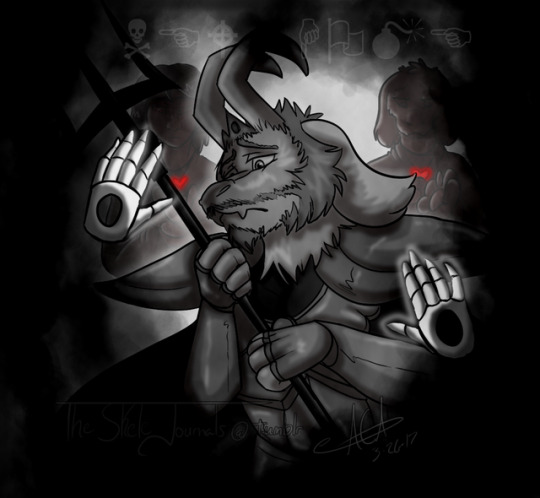
New Home
Once they entered the elevator, Frisk looked up to watch the screen quietly. I stood beside them, watching the same screen with only a single glance at their face. This elevator was designed specifically to take the user from the Core to New Home, and vice versa. While some things in the underground seemed impossible, it was inventions like this and magic that proved anything could happen with a bit of bending the rules. Perhaps that statement stood for Frisk as well.
I'm not sure what you intend to do, child. But like everyone else, I wish you the greatest of luck.
When the elevator stopped, the human stepped out to be greeted by a massive stretch of gray. They paused, looking around to get their bearings with raised brows. New Home was a large area, the Capital of the monsters for a hundred years now. It wasn't as bright as the other regions of the underground, but everyone who lived there seemed to be ok with that. Ahead of Frisk stretched a long path, one that had been built for travelers who wanted a quicker route without having to wander through the city to the chapel. That, and ultimately the palace. Straying off the path led into the city, the likes of it viewable easily from their position.
Mustering their resolve, the child pressed onward. The child seemed a little surprised to find they weren’t confronted by anyone, occasionally glancing around as if waiting for it. The path led them to a rather quaint looking house, identical in practically every way but color to the one the child had stayed in while in the Ruins. It looked just like Toriel’s house.
Frisk looked at it in confusion, obviously thrown off by the building that was so familiar yet obviously not the same. Despite that, they moved onward curiously, carefully, not sure what to expect of the monster king awaiting them. Stepping inside was even worse deja vu than being outside. The layout was exactly the same, even to how it was decorated. The former queen had taken heavy inspiration from her old home, it seemed.
Frisk stared in wonder as they looked around, finding that the immediate way to the basement was blocked by locks and a friendly note that told of the homeowner being away in the garden. Still in a daze of confusion and awe, the child went to gather the aforementioned keys, their eyes constantly roaming around to take every little thing in.
As they went, a few monsters began to emerge from different places, only to disappear moments after they came. Instead of being aggressive like most had been before, however, they talked. Each of them shared a piece of our history, giving Frisk all the information they needed about our past, more detailed than that of the plaques they'd read in Waterfall. By now, every monster in the underground knew there was a human on their way to Asgore.
The seventh human.
The one they'd been waiting for since our king first promised us freedom.
Even then, something in the eyes of every monster told me they didn't quite see this child as just a human. They saw Frisk as their salvation, sure, but they didn't look at them as simply a ticket to their freedom. They saw another lost soul among them.
Waiting, longing to be free.
I found myself glancing at Frisk’s face from time to time to see if their eyes would change as the story continued, revealing things that were certainly sensitive to the prince. They did not. Even as the child entered the sibling’s old room, the adopted child of the royals made no reappearance. It seemed they would stay quiet for the tale.
Finding a locket, Frisk scooped the piece of jewelry up more delicately than they had any other piece of clothing they'd encountered along their way. They gazed at it thoughtfully, running a thumb over the old piece, something in their eyes searching.
That was yours, prince. Do you remember it?
As if somehow the child had heard me, Frisk gave a soft smile, gripped the locket close, then slipped the necklace on over their sweater. We both looked down at it for a moment, and in doing so I swear I saw a soft, red glow appear around the locket. It was almost like a spark, a blink and you miss, and then the most gentle, soft red pulse coming from the necklace. I stared with parted lips of surprise.
You do remember then.
As the child continued to explore the house, something about their expression seemed… unsettled. Sad. I wasn’t a mind reader, but when a person is alone they often let their thoughts portray more on their faces than they would with others around. Frisk did just that each time they came across something of Asgore’s. They’d gain a small, sad, uncertain frown, lingering for a moment before they went onward.
He doesn’t sound like the ruthless, scary king the humans and even some monsters would lead you to believe, does he little one?
With a soft sigh and having gathered both keys, the child went back to the locks and removed them. They paused at the top before even taking their first step, looking down with a reluctance that any soul would feel when they thought they were about to do something they truly, sorely didn’t want to. Their hand traced up to grip the locket, holding it tight to their chest. I moved behind them, laying an unfelt hand on their shoulder with my own soft frown.
You can do it, Frisk. Don’t fret. Then a soft, very soft smile. Stay determined.
What they planned to do, I was not sure. As many timelines as I’d seen with the scenarios of the final child, their fate could take them so many different ways. In my time with them, I had grown confident that Frisk would do anything and everything in their power to do what they felt was right. Their merciful determination had brought them further than any human had gotten before. And I was proud of them.
For the first time in a long time, I had faith. I believed in them.
Whatever got my sons and my love a better life, I was sure they'd find a way.
Nodding to themself with another sigh, Frisk straightened up and jogged down the stairs. As they went, the monsters kept appearing and the story kept unfolding. Their hand remained gripping the locket, keeping it close to their chest as they listened to the despairing story of how we lost our princes. Their face saddened with each line spoken, each step taken.
They were both just children trying to do what they thought was right for their people.
The story came to an end as they entered a courtyard, pausing to stare up at the looming chapel in front of them. A place that meetings were often called with as many citizens that could be gathered. The very same place Asgore had announced the previously mentioned prince's deaths.
Upon entering, Frisk paused at a long stretching hall painted with magical sunlight through stained glass windows. It wasn’t like most chapels, but instead more of a glorified hall for those to come and seek shelter and passage to the palace.
At the end of the hall stood a figure, bathed in shadow. The child hesitated for a moment, unsure, before walking forward and dropping their hand from the locket. As they got closer, their company stepped into the light with a soft, casual grin.
Sans was there to greet them.
My son stood there, speaking of judgement and trials. While I’m sure Sans would have acted had he been pushed to it, he did not. He had found no reason to judge the child for any wrong doing, for in their journey, there hadn’t been any. Frisk had done everything they could to spare and have mercy on every soul they met, great or small alike. A true soul of peace.
Satisfied and relieved with the fact he didn’t have to do anything to the human, Sans stood there for a moment. Like Alphys, I could tell that he felt conflicted about the child leaving. He’d grown attached, little by little, by watching their journey. Like father like son, one would say.
"you’re about the face the greatest trial of your entire journey,” he told them. “your actions here... will determine the fate of the entire world. if you refuse to fight, asgore will take your soul and destroy humanity. but if you kill asgore and go home... monsters will remain trapped underground. what will you do?"
The child blinked up at him, their hand raising and hovering over their chest. Simultaneously over their soul and the locket. After thinking about it, Frisk raised their hands to sign.
“Keep going.”
Sans grinned, chuckling softly with a nod and a lazy shrug.
"well, if i were you, i would have thrown in the towel by now. but you didn't get this far by giving up, did you? that's right. you have something called 'determination.'” Giving a small, knowing smirk, Sans shrugged again. “so as long as you hold on, so long as you do what's in your heart... i believe you can do the right thing."
In return, Frisk gave him a grateful smile. They stepped forward, pausing in front of him hesitantly, then rushed that last step to grip Sans tight in a hug. My son paused, taken aback, before grinning softly, slowly and returned the hug, patting their head with a chuckle.
“...alright. we’re all counting on you, kid.”
Giving them a quick squeeze, Sans let go and grinned encouragingly, holding them at arms length while giving them a wink.
“good luck.”
With one final pat, Sans stepped back and teleported away. The hall was left with only the soft echo of the magical sound and Frisk staring where he’d once been. Sucking in a breath to gather themself, Frisk reached up to grab the locket, gave it a soft squeeze, then dropped it back to their chest and continued down the end of the hall. Following them with a soft smile, I shook my head as we went.
Even someone who’s been gone for a hundred years… you intend to save them too somehow?
Well, at this rate, I wouldn’t put anything past Frisk. I’d see where this child would inevitably take us in the end.
Leaving the chapel, another passageway stretched before them. Frisk continued on until they met the end with a large archway, a plaque above their head reading “Throne Room.” The doors had been removed long ago, revealing beyond a sight much like what you would see on the surface. A sight of true wonder and beauty and time.
Scattered across the floor was a gathering of hundreds of golden flowers. The same magical sunlight as before speckled across the ground, filtered through the windows high above, convincing enough to anyone who didn't know better to be actual sunlight. The gentlest of breezes rustled the grass and other plants that had managed to grow, along with the soft sound of birdsong from different corners of the room. In the middle of the room sat the king's throne, settled on a patch of floor that didn't have any foliage immediately around it.
And not far from his seat, with his back turned and softly humming to himself, stood Asgore Dreemur.
The king of all monsters, my oldest friend, my brother.
I watched as he turned to greet the child happily like any other citizen, only to take a step back in shock and dismay when he saw who it was. Frisk paused. The two stared at one another a moment, unsure what do.
The final child stood before Asgore, and Frisk beheld the king they had been told would end their journey.
Finally Asgore broke the silence, pacing in front of his chair slowly. He looked quietly distraught, his friendliness only strained because he knew what he had to do. Every movement and tone showed that he wanted to do the exact opposite of the fate set before them. Asgore tried a touch of friendly conversation at first, before hesitantly telling them to meet him further up ahead whenever they were ready. The child lingered back for a moment as he vanished.
Their uncertainty was clear on their face, twisted much like Asgore’s had been. Frisk wandered toward where he disappeared, first looking at another throne hiding beneath a sheet and then back toward the archway with a frown.
You intend to change fate, don't you? How will you go about it then?
With a sigh, Frisk pushed themself onward slowly, meeting the king at the barrier’s edge with wide eyes. They approached slow and beheld the massive structure of magic, taking in the sight of what ultimately kept the monsters trapped. Even standing there with the child, Asgore barely looked at them, instead staring out the barrier sadly. Tiredly. I'm sorry, old friend. Whenever he did, he offered a small smile. He gave them several chances to turn back, to maybe go and enjoy the underground a little more.
Frisk softly shook their head in return.
With a deep sigh, Asgore nodded and composed himself, straightening. He turned his back to the barrier to face the child, towering over them easily. His smile was shaky, small, as seven soul canisters rose from the ground on either side of him. I stared at each one, remembering the months spent building each one.
One of them was empty.
The human looked at it for a moment before gathering themself as well, looking up then at Asgore with a frown and a shake of their head. They would not fight.
His face fell slightly, arching his brows sadly before shaking his head too with a regretful smile.
“Human. It was… nice to meet you.”
Twilight spilled through the barrier. Shifting his cloak, Asgore summoned his red trident into his hand, brandishing it defensively in front of him.
“I've heard the stories of your travels through the underground, child. While I'm forever grateful you spared and showed mercy to my people, I'm afraid… I can't let you show me the same kindness.”
His stance tightened, sucking in a breath and stared forward. Waiting for Frisk to make the first move.
Frisk stared in dismay, clenching their jaw and shaking their head. The child insisted to him that they didn't want to fight. Asgore sunk slightly, bowing his head. Even so, he summoned fire to attack. Frisk dodged, once again telling the king they didn't want to fight. And again Asgore stood his ground. The child's face fell, before a spark of that determination sprung back up and they straightened.
They firmly told Asgore they would not fight.
Swallowing hard, the king gave the smallest shake of his head, before once again attacking.
Looking crestfallen for a second, the human dodged. For a few more turns it was Frisk telling the monster king they wouldn't fight and Asgore retaliating with fire and swipes of his trident. Once they realized that he truly wasn't going to listen, Frisk gripped the locket hard and huffed shakily. Shaking their head, they gathered all the courage they could. Screw your courage to the sticking place, as my bartender would say.
Asgore would hear no mercy, and so for once, it wouldn't win this fight. If they kept it up, he would eventually catch them off guard and take their soul.
What will you do?
As an answer, Frisk took out a knife they had on their person for personal defense. They never used it, absolutely refusing to touch it on their trek. But here, now, they had no choice lest they wanted their soul to be taken. While Frisk indeed wanted to help free the monsters, they also wanted to live on. They gripped both the locket and the handle hard, tears brimming the corner of their eyes. Their hands shook, and their signed words rung in my head from earlier.
Keep going.
With a whispered, “I'm sorry,” the child darted forward. Asgore seemed surprised for a moment before holding the trident out in defense. The two forces clashed, human and monster against each other as it had been two hundred years ago. I frowned as I watched, knowing Asgore was majorly holding back. He could have taken the child out in one hit. While he forbade the child to show him mercy, he himself was using just that on them.
The two went back and forth, both of them on the edge of tears, both of them standing up for each other. As the battle waned, Asgore took more and more hits. Had Frisk truly wanted to kill him, they could have. But they did not.
With a huff, Asgore pressed a hand to his chest and collapsed onto one knee. Frisk immediately stopped what they were doing, stepping back to give him room and putting the knife away. They paused hesitantly, wanting to help but unsure what to do.
Asgore spoke of his fatigue, his desire for this to be over. All of it. The fighting between them now, the barrier, the burdens. How he just wanted to go back to a life he once had. A sad frown crossed my face as I listened, knowing all too well what he took on himself. What I myself had taken on as well to try and help relieve it.
The king wouldn't fight anymore, surrendering himself to Frisk. He told them they could take his soul to cross the barrier, to continue their life outside the underground. Asgore would not stop them.
But the child refused.
Looking up in surprise, the king beheld this child in front of him. The one he had heard used nothing but mercy. Despite him forbidding it, even in the end Frisk would not listen. They would show him mercy.
Asgore smiled shakily in disbelief, a soft laugh as he shook his head. He spoke of dreams and wants, of returning to a life like he had. A wife and children. But this time, it involved Frisk. He would take the child in, if that was what they wished. Frisk smiled softly in relief at his change of heart. For a moment, I let my guard down and smiled too. Even so, I knew it wasn't meant to be. I knew what was about to happen. And it was going to be another instance that was absolutely painful to watch with having no way to stop it.
Hold on you two… it's not over.
Out of nowhere, a ring of white pellets appeared and surrounded Asgore. I frowned heavily, having seen this fate before but still despising it, while Frisk gasped and tried to rush forward to stop them.
But it was too late.
The attacks hit. Already severely weakened, Asgore couldn't hold up. His body shuddered, head bowed as he faded into dust right before our eyes. His soul appeared, floating in the air as if it were still suspended in his chest, before it began to shudder like his body had. It cracked, splintered, before finally shattering into a wisp of dust like his body had before it. My friend, my king, my brother faded away right knee front of us. I swallowed hard, knowing there was nothing I could have done, gritting my teeth bitterly as Flowey popped up with an equally cheery as it was malicious grin.
The soul canisters cracked, shattering and releasing the captured child souls after the flower announced the loss to Frisk. Vines stretched out from the ground to seize them, roping them toward the laughing flower. As the souls merged with him, a bright flash erupted and I was sent back to my window, jostling as I did.
Blinking in surprise, I shook my head and pressed close to the portal to watch, eyes darting to find something, anything, and locate the child. My vision was blurred, static, the most unclear it had been since I was there.
I was practically blinded.
Frisk. Be strong. Be strong, you can do this, you can do this...
A little red heart made its way into my field of vision, and I sucked in a breath and willed all my faith forward. It was all I could do for the horrors the human was about to face.
All I could do for the potential savior or damner of our race. Of my family.
From this point on, I did not know what would happen.
I could only hope that Frisk would pull through. That the last human… would find a way. For everyone.
Stay Determined.
36 notes
·
View notes
Text
FEATURE: Why It Works: The Eccentric Family's Nefarious Villain
I have to admit, I have a bit of a soft spot for The Eccentric Family’s Soun Ebisugawa.
That affection is a little hard to justify. After all, Soun is not a particularly nice man. When Soun felt jealous about his brother’s success in building a family and governing the Kyoto tanuki, he didn’t confront him about it - he orchestrated the assassination of his own brother, setting all of the events of the first season into motion. When it still seemed like his brother’s son Yaichiro might inherit his father’s position, he attempted to kill his nephew, and imprisoned the majority of his relatives in the process. When confronted regarding his misdeeds, he showed no sign of remorse - and even after being banished from Kyoto altogether, he’s reemerged full of nefarious ideas, now gunning to join the tanuki-eating Friday Club.
So yes, Soun has a few minor crimes to answer for. But one of the things I actually, specifically love about him is that he’s so friggin’ unrepentant. The Eccentric Family does not try to make Soun Ebisugawa a sympathetic figure. I wouldn’t consider that a failing of the writing - some people are just not that sympathetic, and though complex antagonists tend to make stories richer as a general rule, that doesn’t mean there isn’t space for cackling villains as well. Though Soun certainly pities himself, pity is the last thing he’d want from anyone else. He is determined to prove his own worth, however vile his methods must be.
Soun’s most recent appearance leans into his ineffable, almost supernatural nature. As Yasaburo tracks the Friday Club into a run-down Kobe establishment, he finds himself before a strange, shadowed room. The emphasis on the threshold here implies he is crossing some key gateway into a different kind of world, a technique the show regularly uses before introducing one of its more fanciful ideas. Just as Yasaburo and his brother once crossed the threshold into Benten’s geographically impossible lake or Nidaime’s unbelievable rooftop estate, so too has Soun now grasped the power of the tengu, the power to make of his world what he wishes.
Soun initially disguises himself as his brother Soichiro, Yasaburo’s father. On an immediate level, it’s easy to see this as both a way to convey his intentions and a way to provoke Yasaburo. Soun has always coveted his brother’s position, and now he thinks he can finally paint over his sibling’s legacy. Filling a cup with sake and offering it to Yasaburo, he appears like some servant of the underworld, biding Yasaburo to join him on the other side.
The lighting and framing of this scene heavily bolster its sense of mythic import. Yasaburo is presented as stranded between the light of the exit and the light of Soun’s candle, underlining the idea that Soun is asking him to cross some mythic passage. The inconstant candle presents Soun as perpetually defined by shadow, wavering between forms and occasionally disappearing entirely. And the overhanging darkness conceals this room’s true threat, a painted portal to hell. The moment Soun’s candle gutters out, his spell of passage is broken, and Yasaburo is torn from the upper world entirely.
All that is to say that The Eccentric Family is very good at portraying Soun as a villain’s villain - he has a constant sense of menace and presence that really sells the threat he represents. I can appreciate a show that really leans into its characters in this way, presenting them as larger than themselves, or the versions of themselves they’d want to affect. But though Soun would never admit it, the last reason I like his character is that in truth, he’s not so ineffable after all.
Soun’s crimes are certainly heinous and likely unforgivable ones, and Soun himself has no interest in being forgiven. But through the course of The Eccentric Family, it becomes clear that he’s as lost as anyone, railing against societal values that he doesn’t understand and which have never helped him. The show’s emphasis on the power and value of family likely tastes like ash in his mouth - after all, Soun feels like he was abandoned by his “true” family, and sold off to the Ebisugawas as a political gesture. Like Benten, he’s driven by a sense of permanent displacement, a feeling that his lack of a true home is a wrong that must somehow be righted.
Soun’s experience with the show’s concept of a “life well-lived” and “the nature of a tanuki” are equally poisoned. The Eccentric Family’s first opening song urged its viewers to enjoy everything, beaming with slogans like “be interesting!” and “wonderful daily life!” That’s what tanukis do, after all - they’re tricksters, but they’re here to have fun. Yasaburo’s father Soichiro embodied this philosophy, and Yasaburo is clearly following in his father’s footsteps, but Soun has never been able to view life as a cooperative, joyful experience. He looks at his brother and sees all the markers of material success - a happy family life, a prestigious name, great respect within tanuki society. To someone obsessed with finding traditional success, the theoretical “nature of a tanuki” would be baffling, even infuriating - and so it’s little surprise that by season two, Soun has settled on abandoning “tanuki nature” altogether.
Of course, none of that justifies Soun Ebisugawa’s cruelty and violence. But hey, he’s a villain - as I said, if he were a totally sympathetic character, he wouldn’t be the same person. I’m okay with Soun being an unrepentant monster, and I don’t mind if never changes his ways. Even the occasional villain is all part of our interesting daily life.
-----
Nick Creamer has been writing about cartoons for too many years now, and is always ready to cry about Madoka. You can find more of his work at his blog Wrong Every Time, or follow him on Twitter.
0 notes